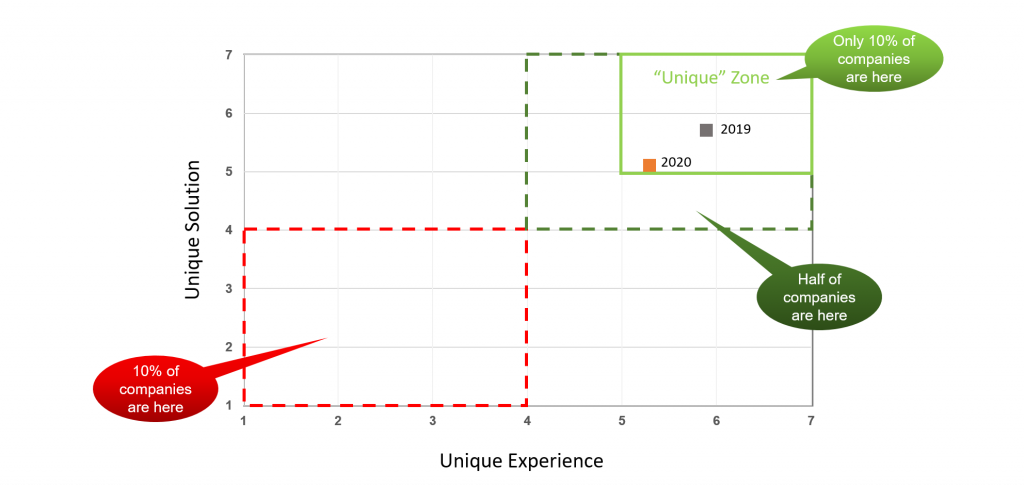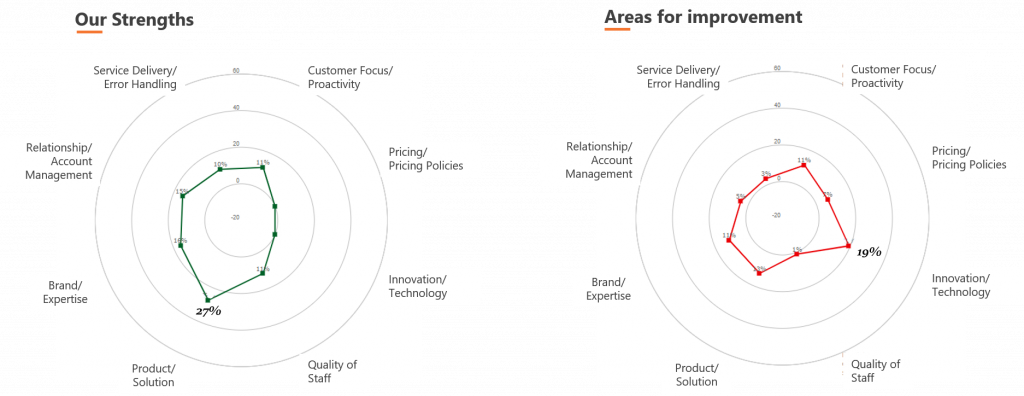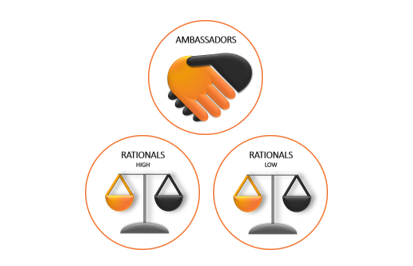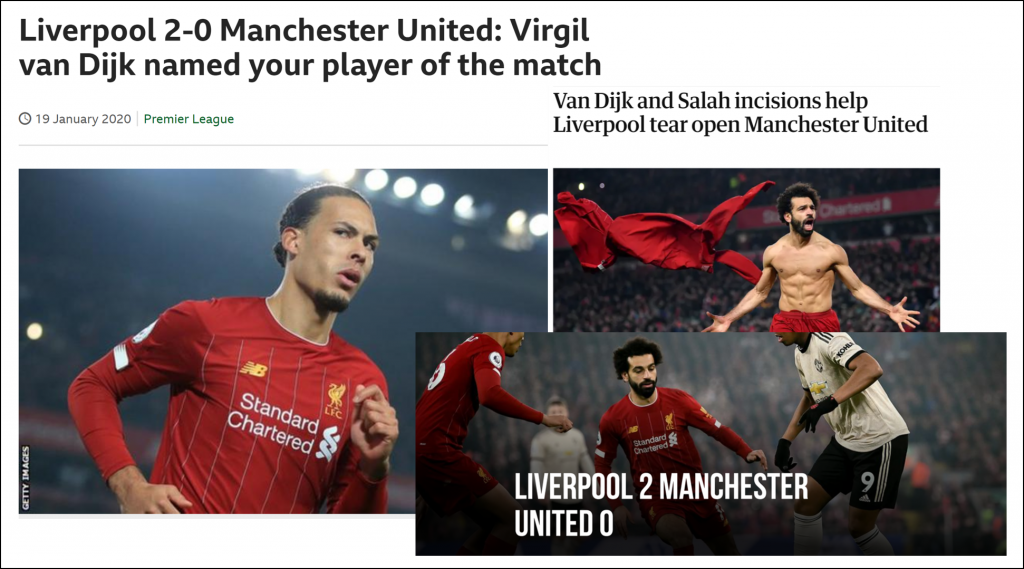55 | 55 | 5.9 | 81
Every year we follow our own advice. We ask ourselves and our clients: “How did we do?” Just like our own clients, we never quite know what to expect until all the numbers are in and until we have read all the verbatim comments.
It’s always nerve-wracking waiting for those results to come through. We might think we know what clients are going to say but we’re never 100% certain. It was especially true this year given that the last 12-15 months have been unprecedented. We have all moved to new ways of working. Business is conducted differently these days.
This year, we also spread the net for our Customer Relationship Quality (CRQ) assessment very wide. We didn’t just limit it to the key decision makers and teams that we work with on a day-to-day basis. This year we canvassed the views of people who use the outputs of our CRQ and ERQ (Employee Relationship Quality) services. For example: account directors and service managers who use our Account Reports and results to build better relationships with customers; divisional heads who use the outputs to inform strategic direction and investments.
We wanted to understand what they think of the tools and consultation we provide and if it really helps them in their roles.
How did we do?
So how did we do?
And what do those numbers 55, 55, 5.9 and 81 at the start of the blog mean?
55
The first number is our response rate. Fifty five percent of the people we asked gave us 10 minutes of their time and completed the assessment. That’s not bad but could have been higher. Some of our clients achieve response rates of 70% or greater.
55
The second number is our Net Promoter Score. It’s the second time we have scored above 50. The actual breakdown is 58% Promoters; 39% Passives; 3% Detractors and the NPS calculation (percentage or Promoters less the percentage of Detractors) gives us our NPS score of +55.
5.9
The third is our CRQ score and that’s the second highest we have ever achieved. It’s on a 1 to 7 scale. An typical CRQ score for a European B2B company is a little above 5. A score of 6 is almost impossible to achieve (at least in Europe!)
81
The final number is the percentage of Ambassadors we have. In many ways, this is the most important number of all. It means that four out of every five clients believes that Deep-Insight offers something truly unique. You trust us and you think our service is second-to-none. This bodes well for long-term relationships with each of these clients.
Our New Approach – Workshops and Support
These are some of the best scores we have ever achieved and when we read through the verbatims, it’s clear to me that one of the key reasons for the high scores is the fact that over the past 12 months we have changed the way we work with clients.
In the past, you told us you needed more consulting support to get the maximum benefit from the customer experience (CX) and employee experience (EX) programmes we run for you. In particular, you asked us to provide more consultancy support in turning insights into action. We now do that by:
- Running workshops to ‘onboard’ the leadership teams to the CX or EX programmes
- Holding CX workshops with customer-facing teams before we ever think about contacting your clients and staff
- Spending more time with account directors/ service managers to get commitments from customers to provide feedback
- Doing the same after that feedback has been given and collated – to ‘close the loop’ with those customers
It was a new process for us last year and you are now telling us that it works. We thought it might, given that we have 20 years of experience in helping companies build and run CX and EX programmes. But we honestly didn’t know until we asked you.
“Are we there yet?”
While we’re really proud of these scores and the comments that accompanied them, no, we’re not there yet. Here are three things we need to do to get there over the next year:
Engage with clients/ individuals who did not provide feedback. While 55% is a decent response rate, a few of our clients gave us a limited amount of feedback. I’m pretty sure that, had they completed the survey last month, our scores would be lower. I believe we still have some work to do to improve the relationship quality with these clients so I will personally be reaching out in the coming days to talk to them about where we may be falling short.
Consider even more CX and EX support. You have asked for even more help to turn insights into action with your customers. We are committed to helping you achieve that, and will pick up the subject with you when we meet with you to ‘close the loop’ on this year’s client assessment.
‘Closing the Loop’ with our own clients. The final thing we need to do with all of our clients is to discuss their own specific feedback on our performance with them. We will be in touch shortly with each one of our clients. We will be asking for time to discuss each client’s specific results and feedback. Our objective is to agree a set of actions with each client that will improve the value we deliver in the coming 12 months. I’m personally looking forward to those conversations.
Thank you again – and expect a call from us
Finally, I genuinely appreciate the time you have taken to give us your feedback.
I must also say a big thank you to our own team in Deep-Insight who have managed to weather the stormy waters of the last 12-15 months. They continue to deliver an excellent service to our clients (your words, not just mine). In particular, I need to thank James Kind for planning, organising and running this year’s “Deep-Insighting Ourselves” assessment.
James joined us in March last year and no sooner had he stepped inside our offices, we shut them down due to COVID. Like many other people out there, James knows his colleagues primarily through Teams and Zoom meetings. I’ve been impressed at how he – and everybody else in Deep-Insight and our clients – has adapted to working from a laptop in an attic, shed, kitchen or bedroom.
In the coming months, all that will change as vaccines get rolled out globally. I don’t believe we’ll ever go back to our old ways of working but that might not be a bad thing.
So, well done James, and thank you to all of our clients. We’ll be in touch with you shortly to discuss your results and agree some follow-up actions.
John O’Connor
CEO, Deep-Insight







